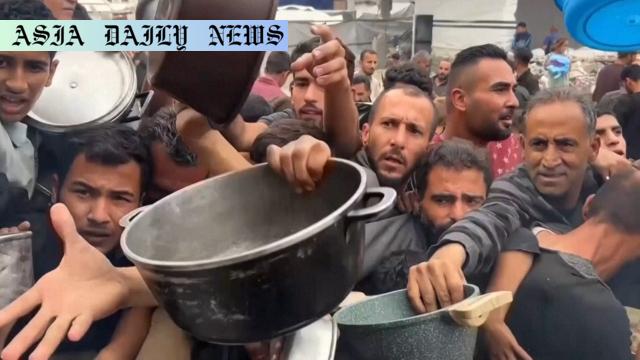Gaza Crisis: WFP announces food stocks in Gaza have run out after weeks of aid blockage, critical needs soar as situation worsens.
WFP reports food stocks in Gaza have been exhausted.
Aid supplies blocked by Israel for nearly eight weeks.
Over 2,000 deaths reported since March 18 attacks.
Food prices surge by 1,400% due to supply shortages.

The Dire Food Crisis in Gaza
The United Nations World Food Programme (WFP) has announced that its food stocks in the Gaza Strip have been completely depleted. After weeks of intensified attack and an aid blockade imposed by Israel, the humanitarian situation in Gaza has reached an unprecedented level of severity. According to WFP officials, they distributed the last of their food supplies to community kitchens serving hot meals, marking a critical point in the ongoing crisis.
Since January, during a temporary ceasefire, the residents of Gaza have witnessed a sharp surge in food prices by as much as 1,400%. For weeks, aid supplies have been obstructed, plunging the region into deeper chaos. This situation has left essential resources like medicine and food critically low, amplifying the suffering of the civilian population.
Resumption of Violence and its Impact
On March 18, Israel resumed its military offensive after ceasefire negotiations with Hamas fell apart. The airstrikes have caused massive destruction, with over 2,000 civilian deaths reported since the offensive restarted. On Friday alone, local health authorities reported 84 deaths, demonstrating the devastating toll this conflict has on human life.
In this fragile environment, bakeries, which were previously supported by the WFP, ceased operations by the end of March. As food stocks dwindle and prices skyrocket, the likelihood of severe malnourishment and hunger-related complications continues to increase. The situation necessitates an urgent response from all stakeholders to mitigate its effects.
The Call for Immediate Humanitarian Aid
The WFP has expressed its readiness to provide sufficient assistance to feed one million people in Gaza for up to four months. However, the organization’s efforts can only materialize if all parties involved allow the unimpeded flow of humanitarian aid. Currently, the blockade has stifled the WFP’s ability to deliver the much-needed food and resources to the region’s vulnerable communities.
This call for action highlights not only the immediate need for aid but also the broader need for international intervention to address the underlying causes of such crises. Greater collaboration, compromise, and accountability from all parties can pave the way for long-lasting peace and stability in the region.
The Human Cost of Conflict
The ongoing conflict in Gaza is not just a humanitarian but also a deeply human crisis. Families are torn apart, homes are destroyed, and livelihoods are obliterated in the face of incessant violence. For those living in Gaza, each day is fraught with uncertainty and fear, especially for children and elderly individuals who are among the most vulnerable.
The devastating food shortages compound the collective anguish of a population already reeling from years of conflict. Without immediate intervention, the situation could spiral further into catastrophe, affecting not just Gaza but regional stability as well.
The Path Forward
Despite the daunting challenges, there remains a glimmer of hope through coordinated international efforts. Governments, non-governmental organizations, and global institutions must work collectively to ensure the swift delivery of humanitarian aid to Gaza. Additionally, dialogue and peaceful negotiations must be pursued to end the blockade and pave the way for broader conflict resolution.
The people of Gaza must not be left to face such dire circumstances alone. It is imperative for the global community to recognize the urgency of this crisis and act decisively to prevent further loss of life and alleviate human suffering. The road to recovery will be arduous, but with cooperation and compassion, a brighter future for Gaza is still possible.
Commentary
The Urgency of Addressing Gaza’s Humanitarian Crisis
The recent announcement by the World Food Programme on the depletion of food stocks in Gaza sheds light on one of the most severe humanitarian crises of our time. The suspension of aid supplies and the resumption of hostilities have left the civilian population in a vulnerable state, with access to basic necessities like food and medicine rapidly deteriorating.
While the numbers — over 2,000 civilian deaths and food price surges of 1,400% — are staggering, they fail to encapsulate the depth of human suffering endured by those trapped in the conflict. For many families in Gaza, daily survival is fraught with challenges that most of us could hardly imagine. Without access to adequate nutrition, the long-term effects on children, pregnant women, and the elderly could be catastrophic, posing a significant threat to generations to come.
A Call for Global Solidarity
This crisis underscores the need for global solidarity and swift action. While organizations like the WFP have expressed their willingness to provide extensive food aid, their ability to act is constrained by barriers imposed by political and military conflicts. The responsibility falls not only on the nations in direct conflict but also on the international community to ensure the humane treatment and survival of vulnerable populations.
More importantly, global leaders must address the underlying issues that perpetuate these cycles of violence and deprivation. This involves fostering dialogue, embracing compromise, and prioritizing humanity over geopolitics. Without addressing the root causes, any humanitarian efforts risk being temporary solutions to chronic problems.
Hope Amid Crisis
Amid the despair, the resilience of Gaza’s people serves as a testament to human strength in the face of adversity. The international community must take inspiration from this resilience and work towards providing the support needed to alleviate their suffering. Every action, from the smallest donation to the largest diplomatic effort, can make a profound difference.
Now is the time for countries, organizations, and individuals to come together and ensure that the people of Gaza are not forgotten. With coordinated efforts, it is possible to provide immediate relief while paving the way for sustainable peace and stability in the region. The stakes have never been higher, and the world cannot afford inaction.


